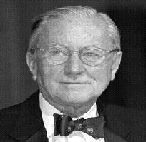
William Colby
CIA Director, 1973-1976
1947-1948, Italy: Nazi Loot used to Rig Election
By Christopher Simpson
The Italian communist party was favored to score heavily in the 1948 elections and many said they might win. This created such alarm in Washington that George Kennan - the foremost, long-range strategist for the U.S. government - advocated U.S. military occupation of the Foggia oil fields.
Washington's apprehension was shared and enthusiastically fuelled by the Holy See. The church's hierarchy was under severe economic and political pressure in Eastern Europe. The prospect of a Communist electoral victory in Italy coming on the heels of Communist gains in Yugoslavia, Hungary, Czechoslovakia and Poland was viewed as the most profound material crisis the church had seen in centuries.
The election campaign was a major test of clandestine political warfare strategy. Allen Dul-les, Frank Wisner, James Angleton, William Colby and other top-ranking U.S. intelligence officials put together a crash program of propaganda, sabotage and secret funding of Christian Democratic candidates designed to frustrate the Italian Communist party's ambitions.
Much of the CIA campaign was handled out of the offices of Allen and John Foster Dulles at the Sullivan & Cromwell law firm in New York. Thayer kept up a steady cannonade of pro-West and anti-Communist radio broadcasts over the Voice of America. Working closely with the Vatican and prominent Americans of Italian or Catholic heritage, the CIA's efforts in Italy succeeded well beyond their expectations. The U.S. dumped $350 million in civil and military aid into the country during the campaign.
Bing Crosby, Frank Sinatra, Gary Cooper and a score of other prominent Americans made radio broadcasts to Italy warning against the Communist electoral menace. A CIA-financed media blitz showered Italian newspapers with articles and photographs expressing American munificence and Communist atrocities, both real and manufactured. The archbishops of Milan and Palermo announced that anyone voting Communist was prohibited from receiving absolution or confession. Eugene Cardinal Tisserant proclaimed that Communists "may not have a Christian burial or be buried in holy grounds." Francis Cardinal Spellman of New York served as a go-between in CIA-Vatican negotiations. "The Vatican [has] been promised that U.S. funds would be made available to assist in the presentation of the anti-Communist appeal to the Italian public," Spellman wrote after a meeting with U.S. Secretary of State Marshall.
The U.S. government, the cardinal said, had secretly "released large sums in 'black currency' in Italy to the [Roman] Catholic Church." A substantial part of this "black currency" for clandestine activities in Italy came from captured Nazi assets, including money and gold that the Nazis looted from Jews. In 1941, the War Powers Act authorized the U.S. Treasury's Exchange Stabilization Fund (ESF) to serve as a holding pool for captured Nazi valuables - currency, gold, precious metals, stocks and bonds - seized as the Germans or other Axis governments tried to smuggle them out of Europe. The captured wealth, which eventually totalled tens of millions of dollars, included substantial amounts of blood money that the Nazis had pillaged from their victims.
The ESF was authorized to safeguard the portion of the Nazi hoard that had been uncovered and confiscated by the U.S. This money became a secret source of financing for U.S. clandestine operations in the CIA's early days. The first known payments from the ESF accounts for covert work were made during the hotly contested Italian election. The CIA withdrew about $10 million from the fund in late 1947, laundered it through a myriad of bank accounts, then used that money to finance sensitive Italian operations.
Much of the CIA's $10 million Italian war chest was delivered through clandestine campaign contributions to Christian Democratic candidates. The CIA refused to fund openly Fascist candidates. A "conscious policy was made in Washington and Rome," former CIA Director William Colby writes, "that no help of any kind was to go to the Neo-Fascists or Monarchists." Reasons for this strategy were ideological and pragmatic. Colby's comment is correct but it fails to reveal the fact that many of the remnants of the Fascists' wartime ruling apparatus, as well as most of the police, had joined Christian Democratic ranks after 1945. The CIA's "black currency" in Italy may not have gone to the discredited, diehard Fascist groups, but it did go to clerics and other leaders who were themselves closely tied to Fascist rule.
Source: From Blowback: The First Full Account of America's Recruitment of Nazis, and its Disastrous Effect on our Domestic and Foreign Policy, 1988. www.mosquitonet.com/prewett/bb088095.html

|
William Colby CIA Director, 1973-1976
|
Helped rig the Italian elections (1948)
Led a $25 million a year program to stop Italian Communists from winning elections (1953-1958)
Source:
www.uno.edu/~camc/Walderthesis.htm
The CIA "spent $10 million in black budget funds to steal the elections. This included disseminating propaganda, beating up left-wing politicians, intimidating voters and disrupting leftist parties. The dirty tricks worked - the Communists lost."
Source: home.att.net/~Resurgence/L-overclass.html